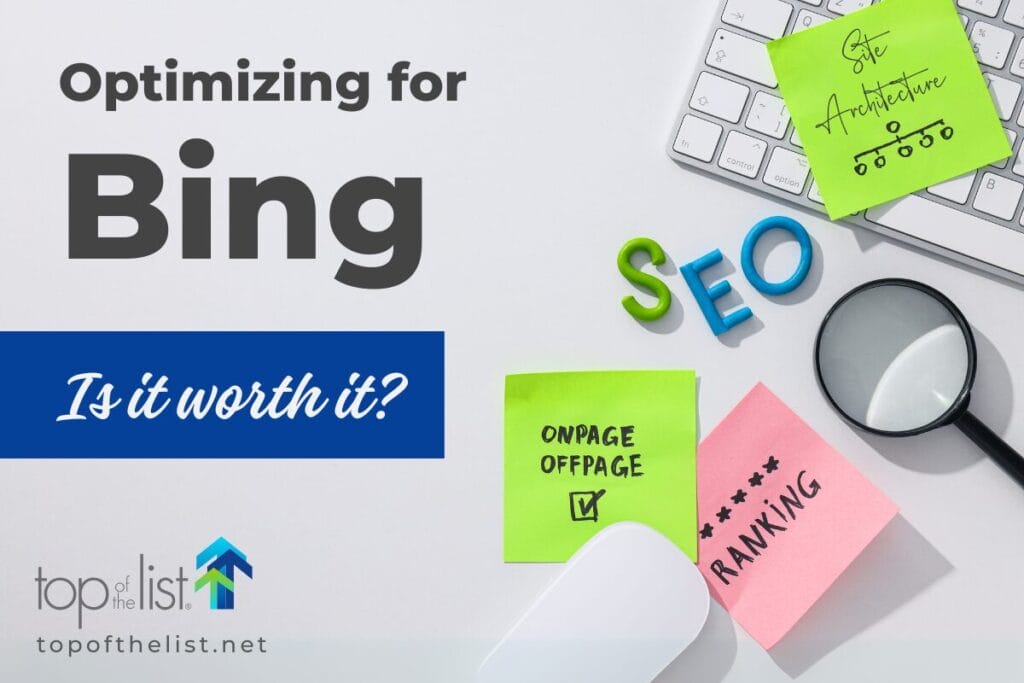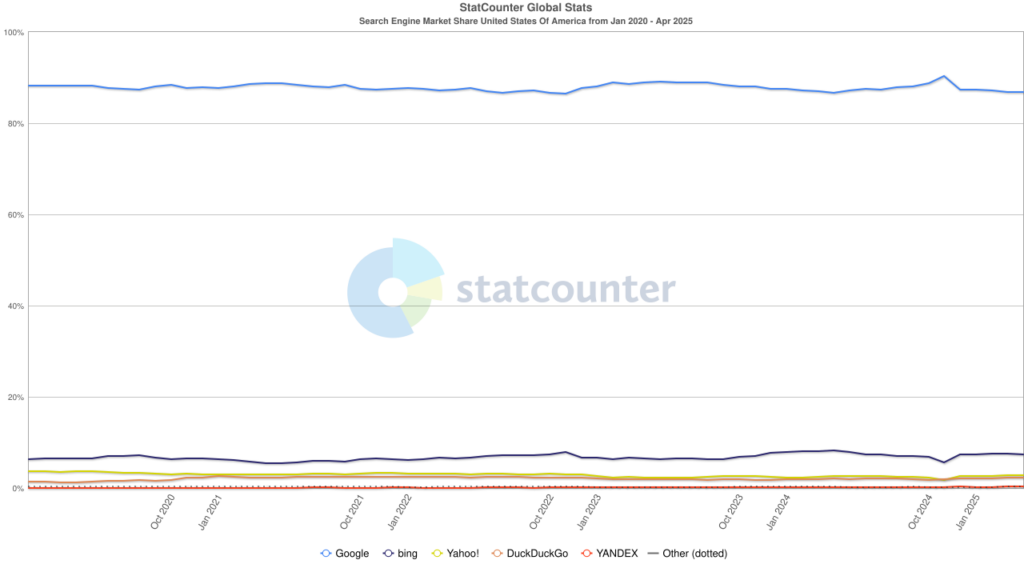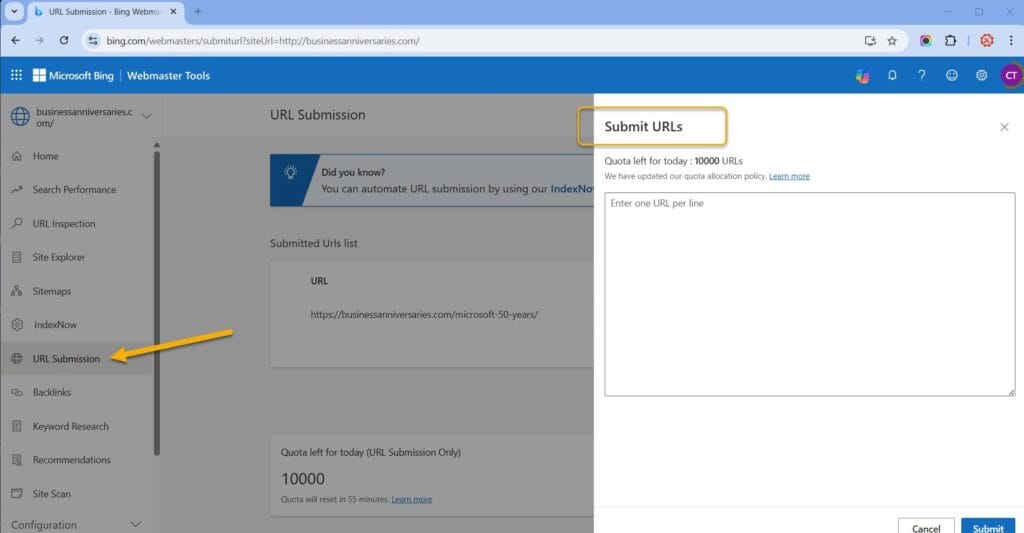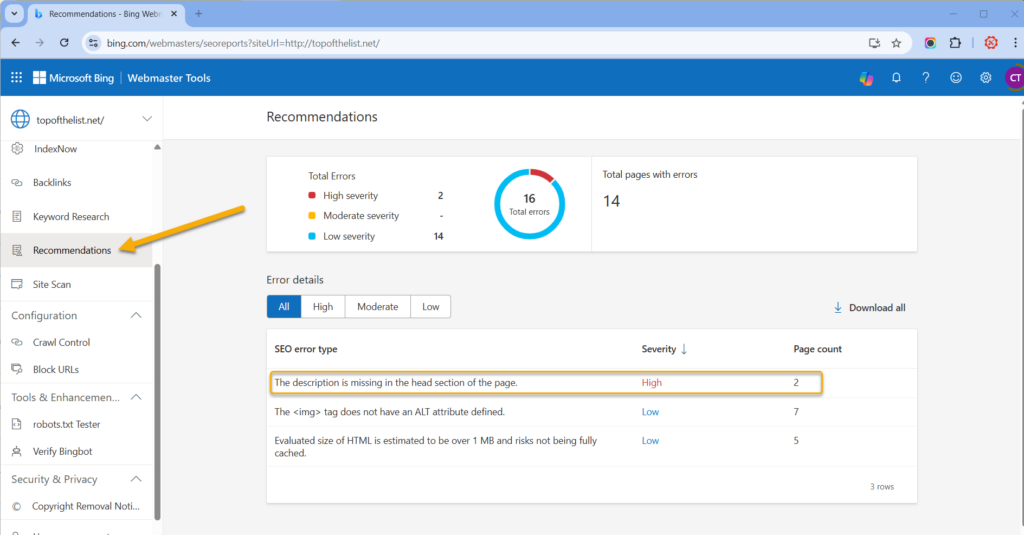
Post originally written March 2020, Updated April 2025
We see it regularly: a website is placing well on a variety of keyword phrases on Google. The same keywords on Bing? 3rd page. 4th page. Nowhere to be found. 🤦
You’d think that if your search engine optimization is solid, you’d perform well across all platforms, but it rarely works that way. Most SEO strategies are built around Google’s ranking algorithm, and Bing’s algorithm operates differently.
While SEO’s typically put most of their eggs in the Google basket, we have to ask, should we be doing anything special to optimize for Bing? And if so, what?
One thing to remember before we move forward is that optimizing for Bing is the same as optimizing for Yahoo. Yahoo! is powered by Bing, thus you will almost always get the same results on Yahoo that you will on Bing.
So when it comes to evaluating the value of optimizing for Bing, the real meaning is that the SEO optimization is for both Bing and Yahoo!
How Many Searches Happen on Bing?
Understanding the reach of Bing can help you determine whether it’s worth the investment in SEO strategies specific to this platform.
U.S. Market Share Trends
Early 2020:
- Google: 88.23%
- Bing: 6.38%
- Yahoo: 3.68%
March 2024:
- Google: 86.94%
- Bing: 8.04%
- Yahoo: 2.48%
January 2025:
- Google: 87.34%
- Bing: 7.38%
- Yahoo: 2.7%
Source: Statcounter

These numbers include all devices in the US, both mobile and desktop as well as tablets and consoles. You may see some heightened numbers for Bing in Global Desktop SERP share reports. A 2025 Global Desktop market report from Statista shows Bing at 12.1% of searches. Still a large gap from the Google shares at over 70%.
So Basically, Bing Optimization Isn’t Worth It, Right?
Short answer: sometimes. While most SEO tools and best practices prioritize Google, Bing can be valuable under specific conditions. Before you rule out Bing completely, consider these facts:
1. Looking at percentages is far different than looking at actual unique visitor numbers.
With such a large percent of visitors from Google vs other search engines, it’s easy to simply place your efforts into Google. Yet a closer look at unique visitors tells a different story.
For instance, according to Statista, in 2023 Google received 276 million unique visitors in the U.S. But Microsoft came in second with 24.4 million visitors. 24.4 million represents a lot of visitors to ignore, and potentially a great opportunity because so many SEO’s do just that. It makes the Bing field less competitive and less costly.
2. Bing is the Default Search Engine for Many Devices
Microsoft owns Bing, so it’s the default search engine across a wide range of products, including:
- Windows CoPilot
- Microsoft Edge Browser
- Microsoft Office
- Cortana
- Xbox
- Amazon Kindle
- Amazon Alexa
With over 1.5 billion Windows devices in circulation, user behaviors suggest that many people simply use the default search option.
3. Other Search Engines Use Bing’s Algorithm
There are many smaller search engines that are powered by Bing, meaning that Bing’s algorithm is at least partly used in determining their own search results. Search engines powered by Bing include:
- Yahoo!
- AOL
- DuckDuckGo
- Lycos
- Yandex
Optimizing for Bing means optimizing for this extended network as well.
4. Bing Serves Specific Niches and Demographics
If you’re in industries like:
- Finance
- Real estate
- Automotive
- Healthcare
… then optimizing for Bing might help you rank higher where competitors aren’t investing effort.
Demographic insights:
- Over 70% of Bing users are 35+
- 38% of Bing users have a household income exceeding $100,000
- Median user age is 45
- Over 60% are male
- Business professionals and executives show a stronger preference for Bing
Device Type:
Bing’s search engine market share increases to over 10% if one only compares desktop searches. Since most B2B businesses use desktop rather than mobile devices, it could also make the case that Bing will reach more B2B customers than initial search engine market share percentages suggest.
Understanding these user behaviors is key to tailoring your SEO strategies.
So Yes or No!?
With all of this information, we believe saying yes or no to Bing has this answer: “it depends”.
If key consumers of your products or services are in the right age group, or if your business targets finance, real estate, automotive, or healthcare,, spending some effort on SEO optimization for Bing makes a lot of sense.
Also, if your budget is limited, Bing makes more sense because it doesn’t take as many resources–either through SEO or paid search–to achieve top visibility.
Finally, looking at the device type your target market uses most frequently can also be a reason to move some of your resources in Bing’s direction.
How to Optimize for Bing Without Losing Google Rankings
If the special circumstances above apply to your business, the best way to optimize for Bing is to do so in ways that won’t diminish your presence on Google.
For example, there is evidence that using keyword meta tags on Bing will improve your placement there. Google, however, has long denounced this practice, and implementing these tags could even be considered keyword stuffing by Google.
As a result, you could sacrifice gains on Google for a piece of Bing pie. Not a good thing! Here are a few SEO tips for increasing placement on Bing and Yahoo without decreasing your placement on Google.
1. Use Bing Webmaster Tools
Start by setting up Bing Webmaster Tools and using features such as:
- Crawler Frequency: Encourage more frequent indexing if your site is updated regularly.
- Submit URLs: Bing sometimes overlooks updates. Manual submission or using IndexNow ensures indexing.
- Sitemap Submissions: Keep your sitemap current, clean, and free of broken links. Update quarterly.


2. Use Exact Match Keywords
Bing’s algorithm is less semantic and more literal—similar to Google in the early days, so it prefers exact keywords. To improve Bing placement we recommend using the exact keyword in each of these spots:
- Once in the Title Tag
- Once in a Heading
- Once or more in the Body *This is where you can get into trouble with Google. If you have a significant amount of page copy, more times may be acceptable. While there is no set right or wrong number, you shouldn’t have any keyword stuffing issues if you’re using an exact keyword once every 500 or so words. Bing, on the other hand, is much more lenient on the use of exact match keywords.
- The body paragraph that contains the exact keyword should be the paragraph immediately following the heading that uses the keyword.
But be careful! Overuse can hurt your Google rankings, so keep your keyword density in check.
3. Put Your Most Relevant Information at the Beginning
Bing doesn’t like reading a lot of copy, and with code-heavy sites this is especially true. Saving your keywords for the 3rd paragraph won’t do much good when you look at all the navigation, headers, and other information Bing has to sift through before it gets to your most important content.
Put the most important content, which should include your keywords, at the beginning of the page. If this doesn’t fit well with the style of your website, use something like a TL;DR section or content summary to accomplish this.
4. Build Backlinks (But Watch the Quality)
Bing gives more weight to the total number of backlinks to your website as opposed to the number of domain links.
What does this mean? Lower quality (some might say domain authority, although this doesn’t technically exist anymore) websites can often offer a larger quantity of links than the higher quality sites.
Now, please don’t take this to mean that you should be trying to get many links from many low quality sites! Avoid link schemes or low-value directories. That is on the verge of black-hat SEO, and could get your website in a lot of trouble.
The concept here is that many SEOs frequently overlook websites that don’t hit a certain mark or “domain authority” because they won’t be on Google’s radar. But just because they have a low domain authority doesn’t mean they are inherently bad.
Let’s pretend you find a mention of your organization on a website with a domain authority of 15. Look at the website and decide if you would trust the information it’s providing. Does it have a lot of links going out but not much information? Pass.
But does it provide value? If so, take the time to request a link or 4. Even though Google may never include this as a backlink, Bing probably will, and it will help increase placement significantly.
5. Boost Social Signals
Bing has admitted in the past that social media signals play an important role in determining the position of a website in search results. Be sure to claim all of your social media accounts, even if you aren’t using them.
- Put your website URL in the appropriate places (Bio, website, about section, etc.)
- Ensure you have a custom URL if one is available (for example, our facebook url is https://www.facebook.com/TopOfTheListSEO )
- Make sure you have included your local search citation (Exact name, address, phone number) where applicable
These social signals can help you rank higher in Bing and drive additional organic traffic.
6. Review Bing’s Recommendations and Fix Errors
Inside Bing Webmaster Tools, the Recommendations tab will point out:
- Sitemap Issues
- Heading Errors
- Missing Image Alts
- Metadata problems, especially length.
The length of title and description meta tags are important. While Google doesn’t really care how long title and description tags are, Bing does, and will lower your page’s placement if you don’t meet its length standards. Usually, you’ll want your title tag shorter anyway, as it might get cut off on the SERP. However, the title tag still carries a lot of weight when it comes to SEO, and there are times when getting cut off is ok just to get the right keywords in the tag.
Fixing these improves both the user experience and helps optimize your site for Bing.

7. Keep Publishing High Quality Content
Nothing beats high quality content when it comes to sustainable SEO. Whether you’re focused on Bing, Google, or both, valuable content aligned with user behaviors and intent will outperform shortcuts every time.
Being an SEO isn’t easy, and as much as we try to do on-page optimization, the best thing we can do is provide information that will be attractive to existing and prospective customers.
That being said, it can be frustrating seeing the fruits of your efforts on Google and then almost nothing happening on Bing!
The above tips should help you gain a stronger foothold on Bing, and provide even better ROI for your business.
About the Author

Nicole Vesota
Vice President & Project ManagerNicole has been working in online marketing since 2007 when she joined Top Of The List. She loves creative endeavors and spending time with her daughter.

Rachel Eager
Marketing Strategist, Top Of The ListRachel, armed with a BFA in Graphic Design from Grand Valley State University, is a seasoned marketing professional known for her expertise in both traditional and digital strategies. Her technical prowess extends to web design and content creation, and she’s driven by a passion for helping businesses reach their target audiences. In her leisure time, you’ll find her enjoying outdoor activities like kayaking and motorcycle riding.

Beverly Mapes
Founder & President, Top Of The ListBev founded Top Of The List in 2006 and has over 25 years of experience working with technology. In her free time, she competes in dog agility competitions with her Golden Retrievers, Cosmo, and Finn.




